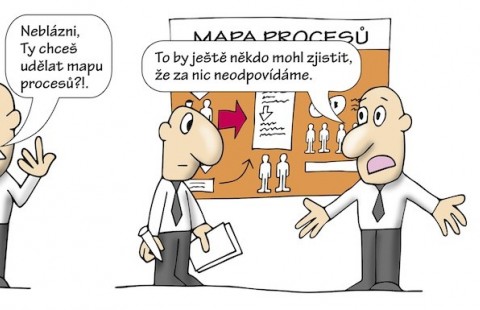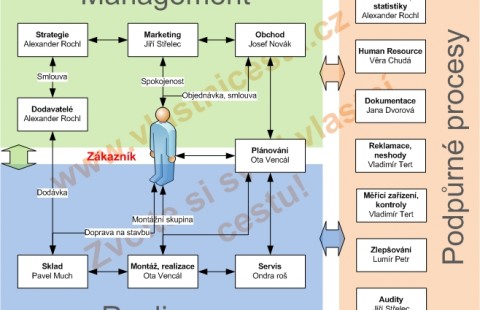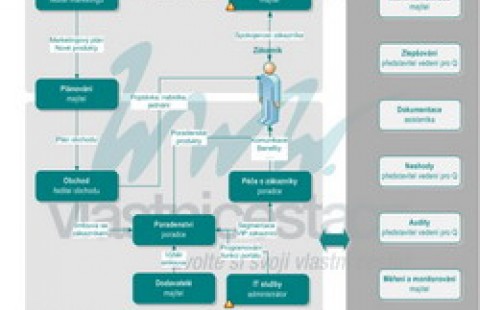Management in a crisis situation very often reach for blanket measures. For example, we will reduce our wages by 20%. We will cancel coffee, meal vouchers, all training and marketing activities are stopped, regardless of the potential of new orders. Are such measures really effective and can help company management get out of the crisis?
Executive and key personnel
Every manager is well aware that some people in the team are performance-oriented. This isn’t usually a large number. On the other hand, there are also those who just move with the others without much effort. Then you have a considerable group of workers who do their job well, but you can't count on them for extra performance. I don't want to deal with the typology of a team here, because there are dozens of different models and names. Let's take a look at the most important workers who pull the team forward. Sometimes they're called a key person. These are the following people:
- those who generally more than others – they perform above average
- those who don't make mistakes and improve the quality of work
- those who participate voluntarily
- those who hold key information - sometimes also business Know-How
- those who are not indifferent to the company - they have chosen it
- those who have years of experience
- …
For example, if a crisis comes, management tend to reduce wages across the board. It's very often one of the largest items in the corporate budget. This is how changes in savings can be seen immediately. But what will it do to workers if you impose such a restrictive measure across the board? Who will feel the greatest contradiction, injustice? Yes, precisely those who have been giving the best performance. During these measures they will remember the overtime, working on weekends or evenings with a laptop and a glass of wine.
Here is another question - “Who can pull a business out of a crisis?” It's those who know the most and perform best. The company needs them most during a crisis. It's necessary to build the transformation of the company on them. In times of crisis, they'll have to work hard (you don't just take into account the time spent at work – they're people who think at home or come up with new solutions at night) or they will also be invited to make very responsible decisions. They're the key people. If these workers feel injustice, they easily think of going to another company. They can quickly put 1 and 1 together. It's them that don't have to worry about getting a job. Other workers can't help you in crucial questions.
If you want to count what it will cost you to lose 5 key people with years of knowledge and experience, then count:
HR wage for employee selection* approx. 2-3 months + ⌀ wage per employee * training duration (1-12 months depending on the type of position) + damage caused by departure + representation costs + sometimes departure of key -bound customers + sometimes departure of workers bound to key-people +… * number of key people leaving

The Real | Interim Manager for Your Changes

Manager work model

Time management - making use of time effectively

Jak správně tvořit mapu procesů

Modelling and setting the processes and procedures - ISO 9001

Training - preparation of the SWOT analysis and strategy

Company Management System of Quality Step by Step - ISO 9001

Process map acc ISO 9001 - business offer

IT staff communication
Even in a small company you can count up to millions of Czech crowns.
Crisis management bad habits in practice
I have repeatedly encountered a number of managerial shortcomings. In the event of a crisis, consider measures other than blanket measures which very often give rise to feelings of injustice. They break down the first motivation pillar - SENSE. Preferably, you need to use the potential of those who care about the company. For example, please avoid the following inconveniences (to be worked on in times of no crisis):
- the manager doesn't know who the key person is within their team
- the manager overloads the key person - they can do it reliably and quickly
- it isn't clear what and who actually holds the know-how of the team or company (this is the main problem of small and young companies)
- the manager doesn't know which information is protected (protective information)
- the manager has done nothing to hinder or prevent the key person’s exit
- key persons are ideally developed individually
- the crisis state "stays" for too long, including restrictive measures - just to earn more, people are in second place
- there is no plan to release restrictive measures and rewards for those who helped
- …if you have any other experience, send them to us for discussion….
Possible measures to help you be fair and rigorous even in times of crisis, for example:
- keep the key person's wage or increase it with respect to their performance
- offer reward to the key person for the first benefits and the crisis decline
- make an increase plan for the key person or compensate their frustration (not just about money!)
- give them some assurance that you're interested in them in the years to come
- …..
Everyone is different. We all have different attitudes. Usually there is a ratio of a certain number of employees to a manager, so they should know their employees. Let's not throw them all in the same bag when it comes to a crisis. Let us show that we know their uniqueness and respect them.

